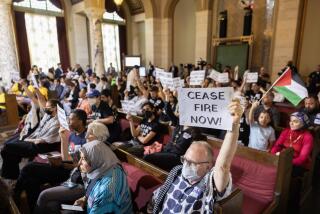Religious Leaders Reject Secession
- Share via
Los Angeles is profoundly dysfunctional but secession is not the way to fix its problems, a panel of the region’s top religious officials said Monday.
The Council of Religious Leaders of Greater Los Angeles concluded that secession proponents have failed to show how breaking up the city would help the poor, improve public safety or protect the rights of residents, all characteristics of a “good” or ethical city.
Currently, three proposals to break up the city of Los Angeles are under study by state officials. If secession measures for the San Fernando Valley, Hollywood and the harbor area survive scrutiny by the Local Agency Formation Commission this spring, they could be placed on the ballot as early as November.
The council, whose members include Cardinal Roger Mahony of the Catholic Archdiocese of Los Angeles, Rabbi Mark S. Diamond of the Board of Rabbis of Southern California and Bishop Jon Bruno of the Episcopal Diocese of Los Angeles, studied secession for a year from an ethical perspective.
“There is no evidence that the poor and disenfranchised of the new cities and of the remaining city will be better off after secession,” the group said in a report released Monday.
The group agreed to study secession last year, at the behest of Mahony.
“We looked at it from a moral and theological dimension,” Bruno said. “We talked about the pros and the cons and [asked], ‘Will this improve the care of the poor and the disenfranchised?”’
The group’s answer, Bruno said, “was that it will not.”
Still, the report said, secession proponents have “legitimate” grievances about the city of Los Angeles.
“We’re very dissatisfied with the way Los Angeles currently functions,” said Rabbi Alan Henkin, regional director of the Union of American Hebrew Congregations, the organization of Reform Jewish congregations. “We just don’t think something as drastic as secession is the answer.”
The group stopped short of urging members and congregants to vote against secession, but Henkin, who was acting as the group’s spokesman, said he expects a number of the council’s members to do so as individuals.
“I will personally do it as Alan Henkin,” the rabbi said. “But we want people to come to their own conclusions. We are encouraging our congregations to sponsor educational forums.”
Tod Tamberg, spokesman for the Catholic Archdiocese, said the church probably will not take a further stand on secession until the measures reach the ballot.
“Once that happens, we will assess the appropriate next step,” Tamberg said.
Richard Close, co-chairman of the pro-secession group Valley VOTE, said he believes breaking up Los Angeles would help the poor “on both sides of Mulholland” Drive, which would separate a new Valley city from Los Angeles.
A new Valley city, he said, would seek funds for social services more aggressively than Los Angeles, he said.
And, Close said, if the religious leaders agree that Los Angeles is dysfunctional, they should support secession, because “there are no alternatives.”
More to Read
Sign up for Essential California
The most important California stories and recommendations in your inbox every morning.
You may occasionally receive promotional content from the Los Angeles Times.










